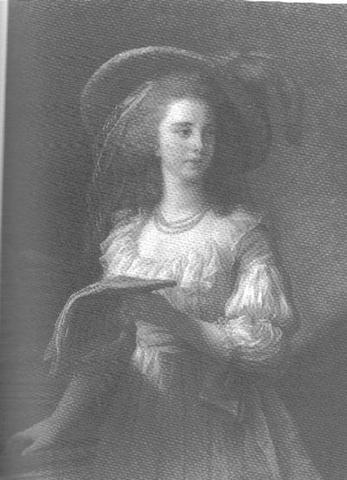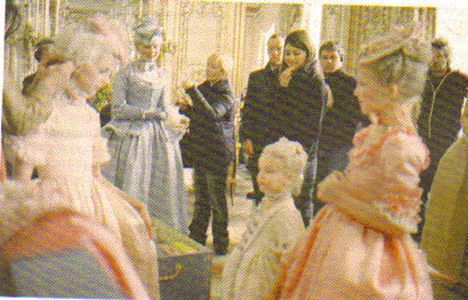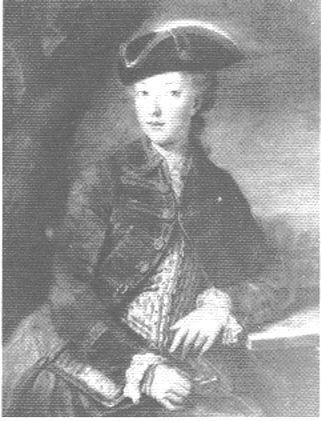Ellen and Jim Have a Blog, Too
We are two part-time academics. Ellen teaches in the English department and Jim in the IT program at George Mason University.


Marie Antoinette and Co.: the latest take · 9 November 06

Elisabeth Vigee-LeBrun (1755-1842), Comtesee de Polignac, 1783
Dear Harriet,
Our good friend, Miss Schuster-Slatt (aka Diana Birchall) has written an excellent review of the recent film. She sent it to a few lists (Janeites, WWTTA, ECW) we are both on and has given me permission to publish it here too:
"I saw Marie Antoinette last night (hm, sounds like I am delusional, put it that way, but I mean the movie). I was intrigued by such mixed reviews on all sides: I’ve had friends tell me it was marvelous and charming, and another person said "Don’t see it, waste of time, the American accents and lipstick
just ruined it for me." So I ventured, thinking that if nothing else at least it would pander to my predominantly frivolous side.
Of course, it immediately became apparent that the American style was deliberate, a clever way to point out parallels and make us place and categorize Marie Antoinette as a recurringly perennial type of woman who appears in all eras (my friend who made that remark just didn’t get it). Everything Kirsten Dunst did with this approach to her role was excellent and the movie is worth seeing for her work alone, though the creative force and theme of the picture does run out about halfway through, so that it becomes borderline threadbare by the end.
The opening was clever and arresting: the scenes of the pretty, thoughtless, very young girl being turned over to the French at the Austrian/French border, being obliged to part with her clothes, her friends and her dog in the middle of the woods, is a fabulous device to start the story. All the scenes showing the heightened absurdity of the French court, seen through the young girl’s eyes, Are indeed delightful; it’s witty, pointed, and has all the appeal of the best sort of fish-out-of-water story, where an individual enters an elaborate, alien and bizarre world. Marie Antoinette at this point is Everygirl, if Everygirl had been reared to be bought in a state marriage and obliged to go through these experiences.

It’s a pleasure to see the weight and intelligence Rip Torn as the old king, Louis XV, and Marianne Faithfull as Maria Teresa, give to their roles. Judy Davis I thought was rather thrown away as Comtesse de Noailles; a Sofia Coppola film is not known for its dialogue (in fact, after the first half, there is virtually none), and so Davis hasn’t much to do except shrilly bark one-note orders, though she does it well.
The best thing about the film, as I’ve said, is the way Dunst matures throughout the story. The marital problems of the young Dauphin and Dauphine, who become King and Queen of France before the blundering Louis has figured out how to consummate the marriage, are intelligently as well as amusingly depicted, and Marie Antoinette in her frustration morphs into something eerily resembling Princess Diana in Frivolous Follower of Fashion mode. It’s not a literal parallel; she’s never as manipulative, nor stuck in as corrosive a marriage, but Dunst shows exactly how Marie
Antoinette’s experiences make her grow in this nripe-rotting-fruit direction – while all the time retaining an essentially sweet-Austrian-girl persona beneath. In showing her growth into a womanhood of gross excessiveness as the direct result of being artificially transplanted into this healthless court, Dunst
does a truly brilliant job.
It’s when the first stirrings of revolution are heard, however, that the picture falls apart. Coppola’s decision to keep the court like an artificial bubble and not show the outside world at all, is not a bad one (and wise in budget terms), but it doesn’t actually work out well. The story becomes tiresomely repetitious, and starts to have longeurs, as nothing happens, the drama and comedy of the court run out of steam, and perplexingly Coppola virtually ceases to tell the story through dialogue. A baby is born, a baby dies, years pass in a minute, all very clumsily, as if we’re getting a heavy-handed abridgement instead of a story. We start to squirm and cough. Then there’s some underplayed beating at the palace doors, an obligatory flame or two, and the King and Queen leave in a carriage. If you didn’t know the history you’d have no clue about what’s going to happen to them. Obviously we do know, but leaving it out entirely fails to produce the desired closing effect.
Coppola’s decision not to show the guillotine might have been praiseworthy for its lack of sensation and bloodthirstiness, but dramatically it’s a dud. The film doesn’t so much end as it runs out of film and you go out saying, "Huh? That’s it?" after having endured the last 45 minutes in increasing annoyance at the
awkwardness that has overtaken the storytelling, almost as if it were two movies by two different directors.
It’s worth seeing for Dunst’s performance as a young queen maturing in a sadly though very understandably wrong direction. She’s no worse than any thoughtless jet setter, but unfortunately doing her "acting out" in the wrong place, at the wrong time.
Diana Birchall"
Miss Schuster-Slatt’s view of Antoinette coheres with Jim Chevalier’s perspective (from a posting he wrote in response to another on C18-l):
" ... A victim? Well, in the end yes. Does obliviousness merit the death penalty? If so, I can think of a few obvious modern candidates for the Big Blade. It’s important to remember too that, I believe, MA was increasingly criticized precisely because she tried to break out of the formality of the French court. In other words, an independence that today might earn her praise helped lead to her downfall.
The basic point is that everything negative that can be said of MA can be said of numerous other nobles and royal mistresses, yet the slanders of pamphleteers and her very foreignness have somehow combined to maker her a symbol of all that was unjust, while other more significant players – Louis XV and Madame de Pompadour come to mind – stand discreetly out of the spotlight of
history.
If anything, it’s rather terrifying to think that the most distorted image of a person can endure despite all kinds of historical correctives (she did NOT say, "Let them eat cake", etc.) because, well, the image is powerful, and works for most people, and so even educated historians are reluctant to let go of it.
None of this is to defend MA in the sense of saying she was enlightened, particularly sensitive, or even someone as an individual that many of us would have liked. But go to any charity ball (as I often did in one point of my life) and you will meet numerous prep school grads/trust fund orphans who are not
one whit more "aware" and yet live blissfully free of fear of the guillotine … "
************
I too find frightening how the public whether then or now seems determined to prefer a particular myth (often a lurid one which projects envy as much as vicarious participation in amorality) to whatever true information one can publish. I found this true in my studies of the historiography of Bath. Why people have so hated Antoinette? My hunch is Louis XVI didn’t have a mistress and since Antoinette was sexual and lived various roles outside that of baby-machine and wife-cow, she became an attractive target. But see Dena Goodman’s Marie Antoinette: Writings on the Body of a Queen (which connects the vilification of Antoinette to that of Hillary Clinto) and Chantal Thomas’s Writings on the Queen.
I’ve always had sympathy for Antoinette (the name I like to call her) since reading as an adolescent girl a biography intended for teenagers: it emphasized how difficult it was for this woman to adjust to French culture and become an icon. I could understand her as a human being from reading Stephan Zweig’s intelligent biography when I was about 18 (his biography on Mary Stuart Queen of Scots is still the best one and I read that around the same time). I’m probably also drawn to her by the descriptions of her in the memoirs I’ve read by women of the era who were ladies-in-waiting in French or other courts and by modern recreations of these in novel form (e.g., Fanny Burney, Madame Campan, Chantal Thomas’s Adieux a la Reine). From ASECS meetings I’m attracted to the woman who ordered the beautiful landscapes.
Finally, I’m fond of Elisabeth Vigee-LeBrun’s portrait of her as an "amazone":
Elisabeth Vigee-LeBrun (1755-1842), Marie Antoinette en amazone (1771)
I suspect those who didn’t like the new film don’t care for the sympathetic take on American culture in it.
Sylvia
P.S. If anyone reads this letter who belongs to Library Thing, I’ve twelve books tagged Marie Antoinette.
--
Posted by: Ellen
* * *
Comment
- A thoughtful review by Daniel Mendelsohn of Sofia Coppola’s movie, Marie Antoinette, appeared in the New York Review of Books, 53:19, November 30, 2006, pp. 19-22.
Basically he concurs with Diana's judgement that the earlier parts of the film are very good, and the latter silly. He suggests that Coppola has no interest in the very part of Antoinette's life (the liaison with F, the internecine politics around the necklace and Petit Trianon, public fall, imprisonment, court case, humiliation and at the last Big Blade) that it is felt necessary to tell each time historians go over her life (though women novelists have of late also not gone into the last years, e.g., Chantal Thomas's fine novel, Adieux a la Reine) or you do something meant to reach a large public. Coppola was pushed into dealing with what does not interest her. Mendelsohn also has some intriguing things to say about how films work (how they get across their meaning, i.e., that Coppola seeks to convey meaning through "visual mood-setting rather than narrative vigor"); on the other hand, he condescends and at the end sneers at Coppola for aspects of her work that are associated with femininity and being a woman, and the last line is a deadly dismissal of her work: "As with the teenaged girls for whom she has such sympathy, her worst imagination of disaster, it would seem, is a messy bedroom."
It’s online at:
http://www.nybooks.com/articles/19652
PS: I agree with him that Zweig's book remains the best general biography.
— Sylvia Nov 21, 6:08am #
commenting closed for this article

